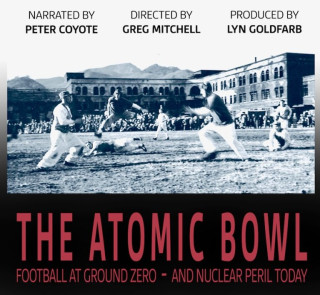Already, when journalists or US officials referred to the atomic attacks on Japan, it was likely that one word, Hiroshima, would be used as shorthand for the two separate catastrophes, with Nagasaki relegated to an afterthought. This meant that Nagasaki was often ignored, an afterthought.
During the past year, US troops had competed in sports in both the Pacific and in Europe. Top brass encouraged this as a way for bored servicemen to—as one put it—“blow off steam,” and to show locals the glory of American sports. So it was no surprise that a Marine commander ordered that a game be held in Japan to coincide with the Christmas and New Year’s holidays, when homesick soldiers would most benefit from it.
Selected as captains of the two squads: Notre Dame’s Heisman-winning quarterback Angelo Bertelli and Chicago Bears star running back “Bullet Bill” Osmanski. A gridiron was cleared near ground zero in front of a middle school which had lost 162 students and 13 teachers to the atomic bomb. A top officer wrote a press release promising that the game, which he dubbed “the first annual Atom Bowl classic,” would have “all the color—and more” of the bowl games to be played that day back in the States, including a Marine band and Japanese girl cheerleaders.
But they would have to play touch, not tackle, football because shards from the atomic blast still littered the field.
In his office over at the harbor, Watt learned about the game around noon and rushed to the site in a jeep on this chilly New Year’s Day. He would describe the game in a letter to his wife later that day: “I was one of the 1500 enthusiastic customers at the Atom Bowl Game. In the long history of football classics, there has been nothing to quite compare with it….
“There were only two wooden bleachers, so we followed the play up and down the sidelines. Here and there were isolated Japanese—a father and his boy, a group of giggly girls, two old men—all looking small and lost and bewildered by it all. Off in the distance on the fringes of the hills were little groups of Japanese regarding the strange Western spectacle in quiet isolation.
